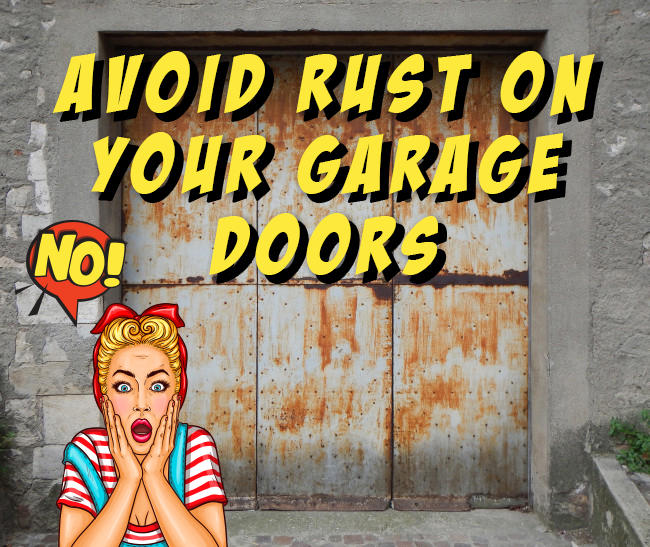Minimize the Chances of Rust Building Up on Your New Garage Door with These Tips
When most folks think of garage door maintenance they understandably think of painting the panels, cleaning any windows, maybe having someone in to look at the garage door opener and things like that. What doesn’t often occur to people is the issue of rust. But rust can be a major concern regardless of whether you have a door with metal panels, glass panels or traditional wood panels. That’s because, even if the panels themselves are not metal the hinges, rollers, tracks, springs, chain and more are made of metal and subject to corrosion just like any other metal objects. So how do you minimize the chances of rust building up on the components of your new garage door? Below we’ll take a look.

When it comes to your new garage door rust is a sneaky enemy. It builds up slowly in out of the way places where you’d never see it if you weren’t looking for it. But just because it tends to occur out of sight that doesn’t mean it should ever be out of mind. Here are a few ways to prevent rust from taking out your new garage door.
Schedule Maintenance Services Regularly
The simplest way to ensure rust doesn’t overwhelm the component parts of your garage door is to sign up for regular maintenance when the door is installed. A Better Garage Door's team will ensure that every part of your garage door system is always in tip top condition. Rust will never get a chance to take hold and you won’t need emergency repairs at a later date.
Keep an Eye on Those Bottom Panels
With metal garage doors rust tends to show up first on the bottom panels; the ones nearest the ground that are constantly bombarded by rain splashing up from the driveway, accumulated snow and standing water. If you begin to notice rust along the bottom of these panels you should clean the panels thoroughly, let them dry and then sand out the rust using a fine grade sandpaper. Afterward you can either make sure to oil the bottom panels regularly or paint the entire door to create a barrier between the metal and the environment.
Make Sure Springs Stay Well-Lubricated
The springs are the workhorses of the garage door system. Unfortunately, they are also the component that is most likely to succumb to rust. Rusty garage door springs are noisy, dangerous and prone to snapping without notice. In order to ensure your garage door springs don’t wind up as victims of rust, it’s important that you have them lubricated on a regular basis. One word of caution though: garage door spring repairs should be left to the pros (read our guide to DIY garage door repair risks to learn a few top reasons why). Have your springs lubricated regularly - but don’t do it yourself.
Have Any Garage Door Damage Repaired Immediately
Sometimes a car or falling tree limb will cause damage to the garage door. This damage can sometimes expose usually hidden components of the door to the elements causing them to rust. Damaged panels can also let excessive amounts of moisture into the garage that will attack all of the metal components of the door. If the car has come in accidental contact with the door and caused damage or if a tree limb has fallen into the door during a storm make sure you have the door inspected and replace the garage door panels and other components that need replacing immediately to prevent rust from taking hold.
Live Near the Water? Don’t Choose a Metal Garage Door
Metal doors have a lot of things going for them including the fact that they are typically the most secure type of garage door. But they’re still metal which means they’re still susceptible to rust. As such if you live near the ocean or a lake or any other body of water it’s probably not a good idea to install a metal garage door on your house. Being close to water is likely to take a significant bite out of the lifespan of your door and have you chasing rust on a regular basis. If you live near water consider a fiberglass door instead.
The Bottom Line
Rust is the ever present but hidden enemy of the garage door and a major reason so many people in Commerce City need replacement garage doors before they ever thought they would. You can prevent rust from claiming your door as a victim however by taking the above tips to heart. For a free estimate on local garage door maintenence and repair services, call the pros at A Better Garage Door.